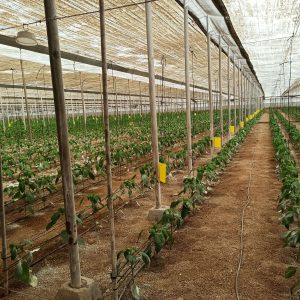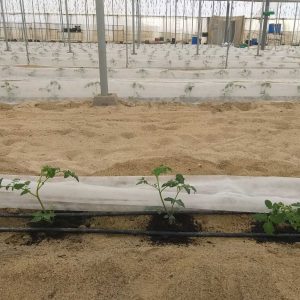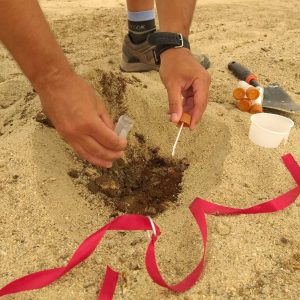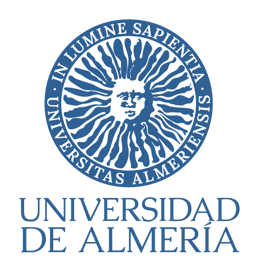Share this
Comparing the impact of biofertilizers and traditional fertilizers
by Juan Vicente Beneitez Lajas on 04/Nov/20
A new project in fields4ever
The University of Almería will take action to recover the soil health through study biofertilizers as an important tool to reduce inputs of traditional fertilizers and to avoid contamination due to intensive use.
Project explanation
Samples required and project description

This project is comprised of 161 BeCrop soil samples, which have been granted as part of the Fields4Ever Initiative.
The samples were collected in traditional intensive greenhouse crops of tomato and pepper of the province of Almería (Spain).
Description
This experiment will analyze if the inoculation of PGPR (plant growth-promoting rhizobacteria) of Azotobacter and Bacillus strains, provided by Nostoc Biotechnologies S.L, can reduce the needs of synthetic fertilizers and increase the production and quality of commercial tomato (CASI S. Coop. And) and pepper (Hortofruticola MABE SAT) crops

Methodology
BeCrop technology will be applied with the main objective of studying the bio fertilizing potential of bacteria strains to fix atmospheric nitrogen (Azobacter spp) and to solubilize phosphorus and potassium (Bacillus spp) to make these macronutrients available to the plants.
Goals

- To study the implantation of PGPR (plant growth-promoting rhizobacteria) in the rhizosphere in tomato and pepper crops under standard field conditions in real crops.
- To study the NPK fertilizing power of inoculated bacteria in the soil of the crops.
- To study the stimulating effect of inoculated bacteria in plants of the crops under standard chemical fertigation and with a reduction of 20% in fertigation
- To study differences in the production and quality of the fruits under the different conditions established in the experiment.
The University of Almería (UAL) in Spain is a young public institution created to exercise a quality teaching and research function that contributes to economic and social development through the transfer of knowledge to companies and society. The UAL pursues excellence in teaching quality and a high degree of international recognition, especially in the agri-food and environmental field through the department of Agronomy and the Research Centre for Mediterranean Intensive Agrosystems and Agrifood Biotechnology (CIAIMBITAL)
Heads of the project

Dr. Isabel Miralles Mellado
Department of Agronomy. Area of Soil Science and Agricultural Chemistry.
I am the leader of the Andalusian Research Group “AGROMA” (RNM-934: Agronomy and Environment) and member of the Laboratory of Soil Microbiology of the University of Almería and the unit of the Research Centre for Mediterranean Intensive Agrosystems and Agrifood Biotechnology (CIAIMBITAL).
I have a degree in Environmental Sciences and a doctorate in Soil Science. I have developed my career in the Universities of Granada and Almería, Santiago de Compostela and CSIC-Natural Sciences Museum (Spain), Bristol School of Geographical Sciences (UK), University of Louvain and Georges Lemaitre Centre for the Earth and Climate Research (Belgium).
I have been awarded numerous prestigious contracts (e.g. Predoctoral FPU, Ministry of Science Postdoctoral Fellowship, Juan de la Cierva Postdoctoral Fellowship, IEF-Marie Curie Fellowships, UAL HIPATIA research contract and Ramon y Cajal Research Contract).
I have published 50 indexed International Journals (47 SCI journals and 3 SJR journals) and participated in 22 Research and Transference Projects and Contracts of whom I directed 1 National Research Project, 2 Autonomic Research Projects and 2 Local Research Projects.
I am a professor in the Environmental Sciences and Agronomy degrees and in the Master of Sustainable Use of Natural Resources and Ecosystemic services of the University of Almería.

Dr. Raúl Ortega Pérez
Department of Agronomy. Area of Soil Science and Agricultural Chemistry.
I am the manager of the Laboratory of Soil Microbiology (www.edalab.es) of the University of Almería and the unit of the Research Centre for Mediterranean Intensive Agrosystems and Agrifood Biotechnology (CIAIMBITAL). The objective of the lab is to provide services of metagenomic studies to other research groups and business companies through collaborations or research contracts. Besides, I lead the agronomical research line of the Andalusian Research group “AGROMA” (RNM-934 (Agronomía y Medio Ambiente).
I have a degree in Environmental Sciences and a doctorate in Soil Science. I have developed my career in the Universities of Almería, Santiago de Compostela and CSIC-Natural Sciences Museum (Spain), Bristol School of Geographical Sciences (UK), University of Louvain and Georges Lemaitre centre for the Earth and Climate Research (Belgium).
I have been awarded numerous prestigious contracts (e.g. Predoctoral FPU, Ministery of Science Postdoctoral fellowship, IEF-Marie Curie Fellowships, UAL HIPATIA contract).
I have published more than 25 papers in SCI journals and participated in 20 research and Transference projects and contracts of whom I directed 4 of them.
I am a professor in the Environmental Sciences and Agronomy degrees and in the Master of Sustainable Use of Natural Resources and Ecosystemic services of the University of Almería.

Dr. Fernando Diánez Martinez (PhD Agronomy)
Department of Agronomy. Plant Production Area
I am currently professor at the University of Almería, in the Department of Agronomy and Plant Production. I have been a teacher of various subjects related to the protection and production of horticultural crops for 19 years. I have been a teaching collaborator in several editions of different courses or international masters.
The activities that I have developed throughout my professional life have been linked to various aspects of plant production. They have been developed in different private companies or national and international public institutions. Intensive and integrated crop production systems have been a fundamental part of the activity carried out in them.
I have published 40 articles in SCI journals, author of 3 patents and participated in 42 research and transfer projects and contracts, of which I directed 15 of them. I have directed 7 doctoral theses and almost 200 students in their end-of-cycle research projects.
Testimonial
“BeCrop tests are fundamental to study the behavior of inoculated PGPR (plant growth-promoting rhizobacteria) in soils and to know the taxonomic dependencies between these and those already present in soils. Besides, the abundance of PGPR can be correlated with NPK contents in soils and plants and with production and fruit quality parameters to infer their role as biofertilizers.”
Share this
- June 2025 (2)
- September 2024 (1)
- August 2024 (1)
- July 2024 (1)
- June 2024 (2)
- May 2024 (2)
- April 2024 (2)
- March 2024 (1)
- February 2024 (1)
- January 2024 (1)
- November 2023 (1)
- October 2023 (1)
- September 2023 (1)
- August 2023 (2)
- July 2023 (2)
- May 2023 (2)
- April 2023 (3)
- March 2023 (3)
- February 2023 (2)
- January 2023 (1)
- November 2022 (1)
- October 2022 (2)
- September 2022 (1)
- August 2022 (3)
- July 2022 (3)
- June 2022 (1)
- May 2022 (5)
- April 2022 (7)
- August 2021 (1)
- July 2021 (1)
- May 2021 (1)
- April 2021 (4)
- November 2020 (3)
- October 2020 (4)
- September 2020 (1)
- August 2020 (3)
- July 2020 (1)
- June 2020 (1)
- May 2020 (2)
